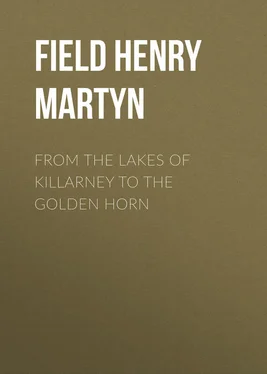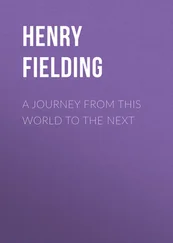Henry Field - From the Lakes of Killarney to the Golden Horn
Здесь есть возможность читать онлайн «Henry Field - From the Lakes of Killarney to the Golden Horn» — ознакомительный отрывок электронной книги совершенно бесплатно, а после прочтения отрывка купить полную версию. В некоторых случаях можно слушать аудио, скачать через торрент в формате fb2 и присутствует краткое содержание. Жанр: foreign_antique, foreign_prose, Путешествия и география, на английском языке. Описание произведения, (предисловие) а так же отзывы посетителей доступны на портале библиотеки ЛибКат.
- Название:From the Lakes of Killarney to the Golden Horn
- Автор:
- Жанр:
- Год:неизвестен
- ISBN:нет данных
- Рейтинг книги:5 / 5. Голосов: 1
-
Избранное:Добавить в избранное
- Отзывы:
-
Ваша оценка:
- 100
- 1
- 2
- 3
- 4
- 5
From the Lakes of Killarney to the Golden Horn: краткое содержание, описание и аннотация
Предлагаем к чтению аннотацию, описание, краткое содержание или предисловие (зависит от того, что написал сам автор книги «From the Lakes of Killarney to the Golden Horn»). Если вы не нашли необходимую информацию о книге — напишите в комментариях, мы постараемся отыскать её.
From the Lakes of Killarney to the Golden Horn — читать онлайн ознакомительный отрывок
Ниже представлен текст книги, разбитый по страницам. Система сохранения места последней прочитанной страницы, позволяет с удобством читать онлайн бесплатно книгу «From the Lakes of Killarney to the Golden Horn», без необходимости каждый раз заново искать на чём Вы остановились. Поставьте закладку, и сможете в любой момент перейти на страницу, на которой закончили чтение.
Интервал:
Закладка:
After this stirring address of Mr. Spurgeon, Mr. Moody announced the arrangements for the meetings, which would be continued in that place for thirty days; and with another rousing hymn the meeting closed. This, it is given out, is to be the last month of Moody and Sankey in England, and of course they hope it will be the crown of all their labors.
After the service was ended, and the audience had partly dispersed, we made our way around to the other end of the building, and had a good shake of the hand with Mr. Moody, with whom I had spent several days at Mr. Henry Bewley's, in Dublin, in 1867, and then travelled with him to London, little dreaming that he would ever excite such a commotion in this great Babylon, or have such a thronging multitude to hear him as I have seen to-day.
And now, what of it all? It would be presumption to give an opinion on a single service, and that where the principal actor in these scenes was almost silent. Certainly there are some drawbacks. For my part, I had rather worship in less of a crowd. If there is anything which I shrink from, it is getting into a crush from which there is no escape, and being obliged to struggle for life. Sometimes, indeed, it may be a duty, but it is not an agreeable one. Paul fought with beasts at Ephesus, but I don't think he liked it; and it seems to me a pretty near approach to being thrown to the lions, to be caught in a rushing, roaring London crowd.
And still I must not do it injustice. It was not a mob, but only a very eager and excited concourse of people; who, when once settled in the building, were attentive and devout. Perhaps the assembly to-day was more so than usual, as the invitation for this opening service had been "to Christians," and probably the bulk of those present were members of neighboring churches. They were, for the most part, very plain people, but none the worse for that, and they joined in the service with evident interest, singing heartily the hymns, and turning over their Bibles to follow the references to passages of Scripture. Their simple sincerity and earnestness were very touching.
As to Mr. Moody, in the few remarks he made I saw no sign of eloquence, not a single brilliant flash, such as would have lighted up a five minutes' talk of our friend Talmage; but there was the impressiveness of a man who was too much in earnest to care for flowers of rhetoric; whose heart was in his work, and who, intent on that alone, spoke with the utmost simplicity and plainness. I hear it frequently said that his power is not in any extraordinary gift of speech, but in organizing Christian work . One would suppose that this long-continued labor would break him down, but on the contrary, he seems to thrive upon it, and has grown stout and burly as any Englishman, and seems ready for many more campaigns.
As to the result of his labors, instead of volunteering an opinion on such slight observation, it is much more to the purpose to give the judgment of others who have had full opportunity to see his methods, and to observe the fruits. I have conversed with men of standing and influence in Dublin, Belfast, Glasgow, and Edinburgh – men not at all likely to be carried away by any sudden fanaticism. All speak well of him, and believe that he has done good in their respective cities. This certainly is very high testimony, and for the present is the best we can have. They say that he shows great tact in keeping clear of difficulties, not allying himself with sects or parties, and awakening no prejudices, so that Baptists, like Mr. Spurgeon, and Methodists and Independents and Presbyterians, all work together. In Scotland, men of the Free Church and of the National Church joined in the meetings, and one cannot but hope that the tendency of this general religious movement will be to incline the hearts of those noble, but now divided brethren, more and more towards each other.
What will be the effect in London, it is too soon to say. It seems almost impossible to make any impression on a city which is a world in itself. London has nearly four millions of inhabitants – more than the six States of New England put together! It is the monstrous growth of our modern civilization. With its enormous size, it contains more wealth than any city in the world, and more poverty – more luxury on the one hand, and more misery on the other. To those who have explored the low life of London, the revelations are terrific. The wretchedness, the filth, the squalor, the physical pollution and moral degradation in which vast numbers live, is absolutely appalling.
And can such a seething mass of humanity be reached by any Christian influences? That is the problem to be solved. It is a gigantic undertaking. Whatever can make any impression upon it, deserves the support of all good men. I hope fervently that the present movement may leave a moral result that shall remain after the actors in it have passed away.
CHAPTER V.
TWO SIDES OF LONDON. – IS MODERN CIVILIZATION A FAILURE?
It is now "the height of the season" in London. Parliament is in session, and "everybody" is in town. Except the Queen, who is in the Highlands, almost all the Royal family are here; and (except occasional absences on the Continent, or as Ministers at foreign courts, or as Governors of India, of Canada, of Australia, and other British colonies) probably almost the whole nobility of the United Kingdom are at this moment in London. Of course foreigners flock here in great numbers. So crowded is every hotel, that it is difficult to find lodgings. We have found very central quarters in Dover street, near Piccadilly, close by the clubs and the parks, and the great West End, the fashionable quarter of London.
Of course the display from the assemblage of so much rank and wealth, and the concourse of such a multitude from all parts of the United Kingdom, and indeed from all parts of the earth, is magnificent. We go often to Hyde Park Corner, to see the turnout in the afternoon. In Rotten Row (strange name for the most fashionable riding ground in Europe) is the array of those on horseback; while the drive adjoining is appropriated to carriages. The mounted cavalcade makes a gallant sight. What splendid horses, and how well these English ladies ride! Here come the equipages of the Prince of Wales and the Duke of Edinburgh, with their fair brides from northern capitals, followed by an endless roll of carriages of dukes and marquises and earls, and lords and ladies of high degree. It seems as if all the glory of the world were here. In strange contrast with this pomp and show, whom should we meet, as we were riding in the Park on Saturday, but Moody (whom John Wanamaker, of Philadelphia, was taking out for an airing to prepare him for the fatigues of the morrow), who doubtless looked upon all this as a Vanity Fair, much greater than that which Bunyan has described!
But not to regard it in a severe spirit of censure, it is a sight such as brings before us, in one moving panorama, the rank and beauty, the wealth and power, of the British Empire, represented in these lords of the realm. Such a sight cannot be seen anywhere else in Europe, not in the Champs Elysées or the Bois de Boulogne of Paris, nor the Prater at Vienna.
Take another scene. Let us start after ten o'clock and ride down into "the city," – a title which, as used here, belongs only to the old part of London, beyond Temple Bar, which is now given up wholly to business, and where "nobody that is anybody" lives. Here are the Bank of England, the Royal Exchange, and the great commercial houses, that have their connections in all parts of the earth. The concentration of wealth is enormous, represented by hundreds and thousands of millions sterling. One might almost say that half the national debts of the world are owned here. There is not a power on the globe that is seeking a loan, that does not come to London. France, Germany, Russia, Turkey, all have recourse to its bankers to provide the material of war, or means for the construction of the great works and monuments of peace. Our American railways have been built largely with English money. Alas, that so many have proved unfortunate investments!
Читать дальшеИнтервал:
Закладка:
Похожие книги на «From the Lakes of Killarney to the Golden Horn»
Представляем Вашему вниманию похожие книги на «From the Lakes of Killarney to the Golden Horn» списком для выбора. Мы отобрали схожую по названию и смыслу литературу в надежде предоставить читателям больше вариантов отыскать новые, интересные, ещё непрочитанные произведения.
Обсуждение, отзывы о книге «From the Lakes of Killarney to the Golden Horn» и просто собственные мнения читателей. Оставьте ваши комментарии, напишите, что Вы думаете о произведении, его смысле или главных героях. Укажите что конкретно понравилось, а что нет, и почему Вы так считаете.












